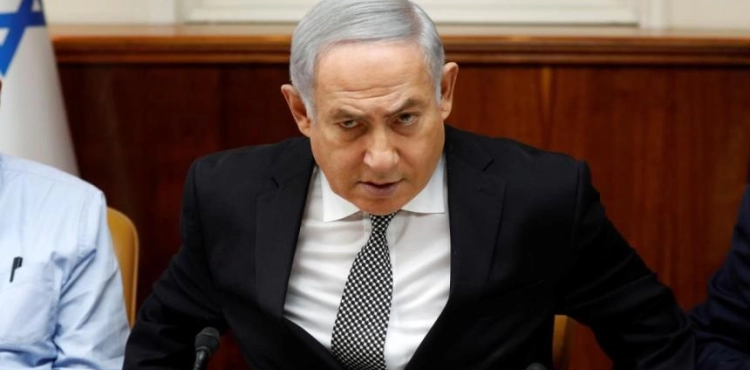TEL Aviv _ Agencies
Israeli Prime Minister Benjamin Netanyahu hopes early elections in April will help him withstand a possible official indictment of corruption, analysts say, while polls suggest he is the closest to winning.
On Monday, the government decided to hold the elections on April 9, seven months ahead of schedule, after it faced major difficulties in passing a law on the recruitment of religious Jews in the army, which is opposed by two religious parties in the coalition government.
The failure to pass the law in the call for early elections, but analysts pointed out that Netanyahu´s legal concerns played a crucial role in that.
State prosecutor Shai Nitsan told reporters last week that he was finalizing his recommendations in three separate cases of corruption and handing them over to prosecutors.
Press reports said he would recommend formally charging corruption to Netanyahu without giving further details.
Analysts said Netanyahu, 69, wanted to face possible charges with a new electoral mandate, betting that the prosecutor would not make his decision before April.
"What made him decide to make the election date was the Nitzan tea announcement that his recommendations were ready," said political science professor at Tel Aviv University Emmanuel Navon.
So far, it seems that the issues against Netanyahu have not affected much the orientation of voters, as a poll conducted on Monday after the announcement of the election date that the ruling Likud Party will remain in power by a large margin.
In the event of re-election, Netanyahu will be the first prime minister to go beyond the period of the founding father of the State of Israel, David Ben-Gurion, for more than 13 years, between 1948 and 1963.
His strong victory in the elections supports his position that the investigations are a political plot to force him to give up power despite the will of voters.
He is not obliged to step down as he has been formally charged.
Hebrew University professor Gideon Rahat said he did not believe the prosecutor would put the election into his own account when the date of his decision was set.
"I think he will probably prefer to wait until after the elections because he does not want Luma to face his influence on the elections or to try to influence the elections," he said.
While opposition center-left parties are in chaos, Netanyahu´s main threat comes from right-wing and center-right parties.
Netanyahu´s reputation as a "security man" helped to a large extent in his popularity among voters, but was greatly influenced by his refusal to launch a large-scale operation against Hamas in the Gaza Strip after months of clashes and even reached a truce with the movement.
The truce led to the resignation of Defense Minister Avigdor Lieberman, leader of the ultra-nationalist party Yisrael Beiteinu, and the withdrawal of the five party members from the government, the most extreme and right-wing government in Israel´s history.
Netanyahu has worked to unify the coalition and has succeeded so far.
There has been speculation he wants to wait and not hold elections until anger over the truce with Hamas subsides.
But after early elections were announced on Monday, Netanyahu faced fresh criticism over his comments in November that he was not responsible for calling for elections and the country was facing a delicate security situation.
The prime minister was referring to a military operation to destroy tunnels found by the Israeli army and accused Hezbollah of digging for military purposes.
Asked why the time was ripe, Netanyahu said the process was nearing completion.
Although there is no real threat to Netanyahu, it is still possible for some figures to emerge suddenly during the election campaigns.
Attention is being paid to the former chief of staff of the Israeli army, Benny Gantz, whose opinion polls say his performance would be good if he ran for election, but did not announce his intentions.
If Netanyahu is likely to win the election bet, the legal issues against him will remain valid and he will likely have to deal with them in the end.
Political commentator Ben Caspit wrote in Maariv newspaper that Netanyahu "realized that time was running out."
"In my opinion, what he is planning may work, but it will be a costly victory, and the clock will stop for a few minutes, allowing him to run for elections, but it will resume vigorously after that."












